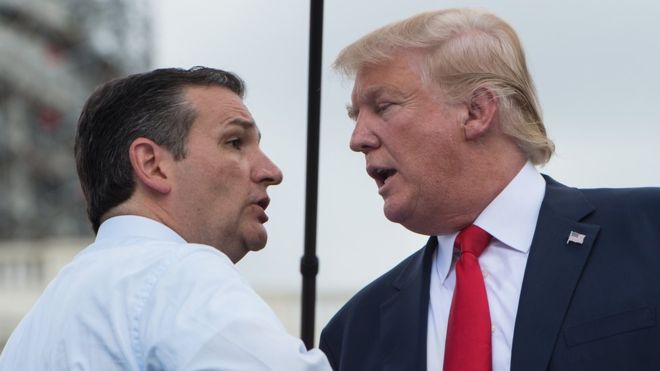
Donald Trump is braced for an electoral setback in the midwest on Tuesday, after suffering the worst week so far in his campaign for the Republican presidential nomination.
The property developer and TV host is expected to lose the Wisconsin primary to Ted Cruz, the firebrand Texas senator who is the leading hope of conservatives scrambling to stop him as part of a deepening civil war within the Republican party.
Cruz has led Trump in all polls of the state in the past week, with two surveys placing his advantage as high as 10 percentage points. Analysts forecast that Cruz could win 39 of the potentially crucial 42 party delegates at stake in the race to the 1,237-delegate finish line.
Trump’s brash style appears to have backfired among Wisconsinites, who wear their conservatism more lightly. He has repeatedly insulted the state’s governor, Scott Walker, who is popular among Republicans, boasting in an interview that he “sent him packing like a little boy” when Walker was among the party’s presidential contenders.
Charlie Sykes, an influential conservative talk radio host in Wisconsin, said on Sunday Trump had “misread the culture and misread the political landscape”.
“We value decency and civility and rationality and reasonableness, none of which is associated with Donald Trump’s campaign,” Sykes told ABC. “When this political music man comes into Wisconsin, he’s actually coming into a town where we kind of see through his scam.”
Asked how damaging a loss in Wisconsin would be, Trump told Fox News Sunday: “I’d like to win it. Is it a big setback? I’d like to win it. It would always be better to win.”
Victory for Cruz, whose unpopularity among the Republican establishment seemed unmatched until Trump’s entry in the campaign, will give renewed optimism to those desperate to prevent the businessman becoming the presidential candidate. Polls consistently indicate that Trump would be badly beaten across the country by Hillary Clinton, the former secretary of state and likely Democratic nominee.
Clinton and Bernie Sanders, the Democratic socialist senator from Vermont, also face off in the Democratic primary in Wisconsin on Tuesday. Sanders holds a narrow lead over Clinton in the state, according to an average of recent polls.
Despair among the self-described “Never Trump” ranks intensified last week as the frontrunner’s campaign staggered from crisis to crisis. In one such instance, he was sharply criticised by other Republicans for reposting a supporter’s unflattering photograph of Cruz’s wife, Heidi, to Twitter.
“Was this my best week? I guess not. I could’ve done without the retweet,” Trump told Fox.
Nationwide polls have not shown any decline in Trump’s overall support, but it appears to have plateaued, at least for the moment, at around 40% of Republicans.
Last Tuesday, Trump’s pugnacious campaign manager, Corey Lewandowski, was charged with battery by police in Florida, for yanking the arm of a young female reporter who was trying to ask Trump a question. Trump continues to defend him.
Trump was even condemned by the notoriously zealous American anti-abortion movement, after telling an interviewer “there has to be some form of punishment” for women who had such procedures if abortion were illegal. He later backtracked to the orthodox rightwing position that abortion providers, rather than patients, ought to be penalised.
On Sunday, he also backtracked on remarks from a Wisconsin rally on Saturday in which he appeared sanguine about the possibility of war between nuclear-armed North Korea and neighbours South Korea and Japan. He had also previously spoken in favour of South Korea and Japan having nuclear weapons.
Speaking to CBS, he said: “The single biggest problem the world has is nuclear. I think if somebody gets nuclear weapons, that’s a disaster.”
Republicans are increasingly anticipating that their convention in Ohio in July will be bitterly contested, rather than seeing the typical coronation of a nominee who has already secured the support of a majority of the party.
Roger Stone, a Trump ally who has advised Republicans since Richard Nixon, has warned of “days of rage” around the convention if the party denies Trump the candidacy.
Reince Priebus, the party chairman, stressed on Sunday that Trump could clinch the nomination by securing the required 1,237 delegates before the convention. Trump currently has the support of 736 state delegates and Cruz 463, according to the Associated Press. John Kasich, the governor of Ohio, has 143.
“There’s nothing can get stolen from anyone,” Priebus told ABC. He pointed out, however, that the rules governing a so-called “open” convention have not yet been set for this year.
If no one wins a majority in the first round of voting, many delegates will become free to realign themselves with a different candidate.



Expositores: Oscar Vidarte (PUCP) Fernando González Vigil (Universidad del Pacífico) Inscripciones aquí. Leer más
Una retrospectiva para entender los próximos cuatro años. Leer más
En la conferencia se hará una presentación de los temas más relevantes del proceso de negociación se llevó a cabo desde el 2012, así como del acuerdo de paz firmado entre el Gobierno colombiano y la guerrilla de las FARC a finales del 2016. Se analizarán los desafíos y las... Leer más
El Observatorio de las Relaciones Peruano-Norteamericanas (ORPN) de la Universidad del Pacífico es un programa encargado de analizar y difundir información relevante sobre la situación política, económica y social de Estados Unidos y analizar, desde una perspectiva multidisciplinaria, su efecto en las relaciones bilaterales con el Perú.
© 2026 Universidad del Pacífico - Departamento Académico de Humanidades. Todos los derechos reservados.

